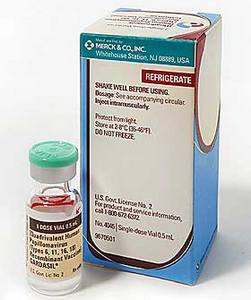HPV vaccines – The HPV vaccine
What is the human papilloma virus?
Human Papilloma Virus (HPV) It represents a group of more than 100 Virus. Some types of HPV can cause genital warts (warts on intimate places), which are growths or bumps, which appear:
- On vulyve;
- Around the vagina or anus;
- On the cervix;
- On the penis, moşonke, groin or hips.
Some strains of HPV cause cervical cancer, or, less often, vulvar cancer, anus or penis.
HPV is easily transmitted during oral, genital or anal sex with an infected partner. Approximately 2/3 people, have sex with a partner, which has genital warts, They may also be. This usually occurs within three months after exposure.
Most people are exposed to contact with HPV at some point in their lives. Not all of them will be infected, or they will have symptoms. Warts can appear within several weeks after sexual contact with an infected person, or until their symptoms can take several months.
What is HPV vaccines?
The HPV vaccine consists of noninfectious virus-like particles. These particles produce antibodies, to prevent HPV infection of body cells. The vaccine is administered by injection into the muscle.

Vaccine Gardasil It protects against four types of HPV strains. It can be used to prevent these diseases:
- Women:
- Cervical cancer, vagina, vulva and anus;
- Precancerous lesions on the genitals;
- Genital warts;
- Men:
- Anal cancer;
- Genital warts.
Another vaccine, which is called Tservaryks, It provides protection from 2 types of HPV strains. It is used to prevent cervical cancer and cervical precancerous condition in women.
Who and when to be vaccinated against human papillomavirus?
The vaccine is recommended for girls 11-12 years in an amount 3 Vaccination. In order to be most effective vaccine, girls should be vaccinated before their first sexual contact. Girls and women aged 13-26 years, who did not receive the HPV vaccine, when they were younger, You should still be vaccinated.
Recommended, boys aged 11-12 years have been vaccinated with Gardasil (3 dose). Boys and men aged 13-21 years, who did not receive the HPV vaccine, when they were younger, You should also be vaccinated.
Men aged 22-26 years may also be vaccinated. Men in this age group should be vaccinated, if they have sex with other men, HIV infection, or have a weakened immune system due to other diseases or medication.
Risks, associated with HPV vaccines
Studies show, vaccine basically causes no serious side effects. As with any vaccine, its effectiveness can diminish over time, and it has the potential, to cause serious problems, such as heavy allergic reactions.
Some problems, that were associated with HPV vaccine include pain, redness, swelling or itching at the injection site. Other side effects include:
- Gardasil:
- Headache;
- A slight rise in temperature;
- Tservaryks:
- Fatigue;
- Headache;
- Muscle aches;
- Joint pain;
- Gastrointestinal symptoms.
Who should not be vaccinated against HPV?
HPV vaccines can not be instilled in the following cases:
- If you have a life-threatening allergic reaction to yeast or any other component of the vaccine;
- In the presence of pregnancy (the effects are still being studied);
- In the presence of the disease (We need to wait for recovery).
What are the ways to prevent human papillomavirus vaccination in addition?
Avoiding physical contact with an infected sexual partner is the only way, to completely prevent the spread of HPV infection. Latex condoms may help reduce the risk of HPV infection and genital warts. But, Condoms are not effective at 100%, because they can not cover the entire genital area.
Other preventative measures include:
- Sexual abstinence;
- Monogamous sexual relationship;
- Regular check-ups for the presence of diseases, sexually transmitted (STD);
- Pap Test for women (since the age of 21 year).
What happens in the event of an outbreak of human papillomavirus?
According to some reports, number of people infected with HPV in the world over the past decade has increased more than 10 times and is 34 million. man (case detection). Since the HPV vaccine can not cure infections, that already exist, the best way to prevent further spread of the disease – get the vaccine before infection.
